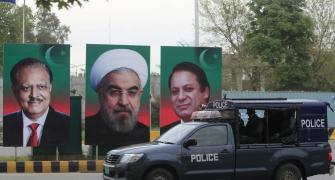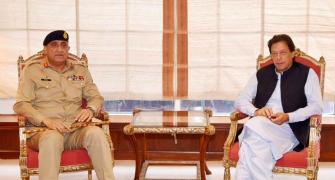Pakistan on Wednesday warned Iran of "serious consequences" after Tehran launched unprecedented missile and drone attacks on terrorist bases of a Sunni militant group in the restive Balochistan province, which killed two children and injured three others.

Two bases of Balochi militant group Jaish al Adl in Pakistan were targeted by missiles on Tuesday, Iranian state media reported, a day after Iran's elite Revolutionary Guards attacked targets in Iraq and Syria with missiles.
Islamabad also summoned the Iranian charge d'affaires here to the foreign ministry and issued a strongly-worded condemnation of Iran's "violation of its airspace", the Foreign Office said.
Iran's attack could potentially raise tensions in the Middle East, already roiled by Israel's war on Hamas in the Gaza Strip.
“Two key strongholds of the Jaysh al-Dhulm (Jaish al-Adl) terrorist group in Pakistan” were “specifically targeted and successfully demolished,” Iran's semi-official Tasnim news agency said.
Claiming that the area targeted is called "Green Mountain", the agency said that the bases were targeted by a combination of missile and drone attacks.
Tehran has repeatedly warned that the Jaish al-Adl militant group is using Pakistani soil in the border town of Panjgur in Balochistan to launch terror attacks on Iranian security forces.
The Foreign Office of Pakistan described the incident as an "unprovoked violation of its airspace" by Iran. It said the attack killed two children and injured three others.
"Pakistan vehemently protests the violation of its sovereignty," the Foreign Office said, adding that it was "completely unacceptable" and may have "serious consequences".
"A strong protest has already been lodged with the senior official concerned in the Iranian Ministry of Foreign Affairs in Tehran.
Additionally, the Iranian charge d'affaires has been called to the Ministry of Foreign Affairs to convey our strongest condemnation of this blatant violation of Pakistan's sovereignty and that the responsibility for the consequences will lie squarely with Iran," the statement said.
It also expressed concern that the "illegal act took place despite the existence of several established channels of communication between Pakistan and Iran".
The strikes were launched the day Pakistan's caretaker Prime Minister Anwaarul Haq Kakar met with the Iranian Foreign Minister Hossein Amir-Abdollahian on the sidelines of the World Economic Forum (WEF) in Davos, Switzerland, The Express Tribune newspaper reported.
It added that the Iranian president's point man for Afghanistan was also in Islamabad recently.
The Foreign Office of Pakistan did not mention the location where the casualties took place. However, it is suspected that the bases were in Panjgur in Balochistan province.
Local authorities in Panjgur preferred to remain silent on the attacks, but some confided that the missile attacks also hit a mosque, partially damaging it and injuring civilians.
"Pakistan has always said terrorism is a common threat to all countries in the region that requires coordinated action. Such unilateral acts are not in conformity with good neighbourly relations and can seriously undermine bilateral trust and confidence," the Foreign Office said.
Jaish al-Adl, or the "Army of Justice", is a Sunni militant group founded in 2012 that largely operates in Pakistan. Iran has fought in border areas against the militants, but a missile-and-drone attack on Pakistan would be unprecedented for Iran.
Jaish al-Adl is the "most active and influential" Sunni militant group operating in Sistan-Baluchestan, according to the Office of the US Director of National Intelligence.
Last month, at least 11 Iranian police officers were killed in an attack overnight on a police station in the southeastern province of Sistan-Balochistan, according to Iranian Interior Minister Ahmad Vahidi, who blamed the Jaish al-Adl for the incident.
He claimed the Jaish militants had entered Sistan from the Pakistan side near Panjgur.
On July 23 last year, four Iranian policemen were killed while on patrol near the border in an attack claimed by the Jaish Al Adl.
In May, five Iranian border guards died in clashes with an armed group in Saravan, southeast of Zahedan, the provincial capital of Sistan-Balochistan.
Over the years, the troubled Balochistan province has become a hotbed for terror attacks, and many banned religious terror, and separatist outfits have also used its soil to carry out attacks against Pakistan's security personnel and installations.









